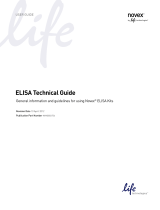
3
(English)
EN
To reduce the risks associated with false-negative results leading to the release of contaminated product:
• Store the 3M Cashew Protein ELISA Kit as indicated on the package and in the product instructions.
• Use the 3M Cashew Protein ELISA Kit for food and environmental samples that have been validated internally or by
a third party.
• Follow the protocol and perform the tests exactly as stated in the product instructions.
• 3M has not documented the use of the 3M Cashew Protein ELISA Kit in industries other than food or beverage. For
example, 3M has not documented this product for testing pharmaceutical, cosmetic, clinical or veterinary samples.
To reduce the risks associated with inaccurate results leading to the release of contaminated product:
• Always use the 3M Cashew Protein ELISA Kit by the expiration date.
• Always prepare working solutions using the 3M Cashew Protein ELISA Kit concentrated reagents at 20-25°C
temperature.
• Do not freeze the 3M Cashew Protein Standard Concentrate.
• If Chromogenic Substrate Solution turns blue, do not use. Follow Good Laboratory Practices
1
to avoid
cross-contamination of 3M Chromogenic Substrate Solution.
NOTICE
To reduce the risks associated with inaccurate results:
• Sample stability after extractions has not been evaluated. The ELISA procedure should be carried out, right after
sample extraction.
• Handle 3M Cashew Protein Standards following Good Laboratory Practices
1
to prevent cross-contamination of
samples.
Consult the Safety Data Sheet for additional information.
For information on documentation of product performance, visit our website at www.3M.com/foodsafety or contact
your local 3M representative or distributor.
User Responsibility
Users are responsible for familiarizing themselves with product instructions and information. Visit our website at
www.3M.com/foodsafety, or contact your local 3M representative or distributor for more information.
As with all test methods used for food analysis the test matrix can inuence the results. When selecting a test
method, it is important to recognize that external factors such as sampling methods, testing protocols, sample
preparation, handling, and laboratory technique may inuence results. The food sample itself may inuence results.
It is the user’s responsibility in selecting any test method or product to evaluate a sucient number of samples to satisfy
the user that the chosen test method meets the user’s criteria.
It is also the user’s responsibility to determine that any test methods and results meet its customers’ and suppliers’
requirements.
As with any test method, results obtained from use of any 3M Food Safety product do not constitute a guarantee of the
quality of the matrices or processes tested.
Limitation of Warranties/Limited Remedy
EXCEPT AS EXPRESSLY STATED IN A LIMITED WARRANTY SECTION OF INDIVIDUAL PRODUCT PACKAGING, 3M
DISCLAIMS ALL EXPRESS AND IMPLIED WARRANTIES, INCLUDING BUT NOT LIMITED TO, ANY WARRANTIES OF
MERCHANTABILITY OR FITNESS FOR A PARTICULAR USE. If any 3M Food Safety Product is defective, 3M or its
authorized distributor will, at its option, replace or refund the purchase price of the product. These are your exclusive
remedies. You must promptly notify 3M within sixty days of discovery of any suspected defects in a product and return
it to 3M. Please call Customer Service (1-800-328-1671 in the U.S.) or your ocial 3M Food Safety representative for a
Returned Goods Authorization.
Limitation of 3M Liability
3M WILL NOT BE LIABLE FOR ANY LOSS OR DAMAGES, WHETHER DIRECT, INDIRECT, SPECIAL, INCIDENTAL OR
CONSEQUENTIAL DAMAGES, INCLUDING BUT NOT LIMITED TO LOST PROFITS. In no event shall 3M’s liability under
any legal theory exceed the purchase price of the product alleged to be defective.
Storage and Disposal
Store 3M Cashew Protein ELISA Kit contents at 2-8°C. Do not freeze. Store diluted working solutions as described in
Table 1.

























